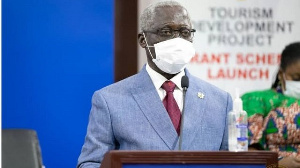 Yaw Osafo-Maafo, Senior Presidential Advisor to President Nana Addo Dankwa Akufo-Addo
Yaw Osafo-Maafo, Senior Presidential Advisor to President Nana Addo Dankwa Akufo-Addo
Senior Presidential Advisor to President Nana Addo Dankwa Akufo-Addo, Yaw Osafo-Maafo, has noted that among all the continents, Africa has the most youthful population.
He stated that this poses a security threat to the continent if the youth are not given employment.
He said the African Continental Free Trade Area (AfCFTA) has the potential of being the game-changer in providing employment for the unemployed youth.
Speaking at a meeting the AfCFTA had with all the regional economic blocs, the former Senior Minister said “We need the regional economic communities to function well if the AfCFTA is to achieve the desired outcomes, enhance Intra Africa trade, economic transformation, job creation for the teeming youthful population and poverty reduction, among others.
“All the continents, Africa has the most youthful population and this itself is a threat to security if we do not take steps to provide employment for this population.
“Indeed the AFCFTA has the potential to be the game-changer for the transformation of African economies and post covid 19 economies if we can harness its numerous benefits.”
The AfCFTA is a free trade area founded in 2018, with trade commencing as of 1 January 2021.
It was created by the African Continental Free Trade Agreement among 54 of the 55 African Union nations.
The free-trade area is the largest in the world in terms of the number of participating countries since the formation of the World Trade Organization.
Accra, Ghana, serves as the Secretariat of AfCFTA and was commissioned and handed over to the AU by the President of Ghana Nana Akufo-Addo on August 17, 2020 in Accra.
The general objectives of the agreement are to: create a single market, deepening the economic integration of the continent;
Establish a liberalized market through multiple rounds of negotiations; aid the movement of capital and people, facilitating investment; move towards the establishment of a future continental customs union; achieve sustainable and inclusive socio-economic development, gender equality and structural transformations within member states; enhance the competitiveness of member states within Africa and in the global market; encourage industrial development through diversification and regional value chain development, agricultural development and food security; Resolve challenges of multiple and overlapping memberships.